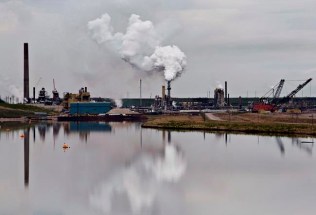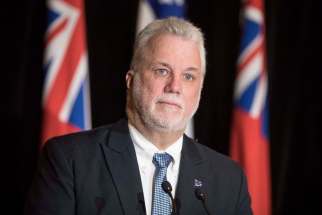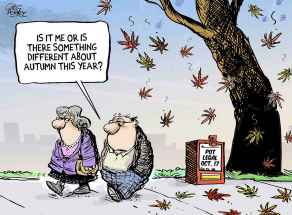Line has been drawn on climate change
Read this article for free:
or
Already have an account? Log in here »
To continue reading, please subscribe:
Monthly Digital Subscription
$0 for the first 4 weeks*
- Enjoy unlimited reading on winnipegfreepress.com
- Read the E-Edition, our digital replica newspaper
- Access News Break, our award-winning app
- Play interactive puzzles
*No charge for 4 weeks then price increases to the regular rate of $19.00 plus GST every four weeks. Offer available to new and qualified returning subscribers only. Cancel any time.
Monthly Digital Subscription
$4.75/week*
- Enjoy unlimited reading on winnipegfreepress.com
- Read the E-Edition, our digital replica newspaper
- Access News Break, our award-winning app
- Play interactive puzzles
*Billed as $19 plus GST every four weeks. Cancel any time.
To continue reading, please subscribe:
Add Free Press access to your Brandon Sun subscription for only an additional
$1 for the first 4 weeks*
*Your next subscription payment will increase by $1.00 and you will be charged $16.99 plus GST for four weeks. After four weeks, your payment will increase to $23.99 plus GST every four weeks.
Read unlimited articles for free today:
or
Already have an account? Log in here »
Hey there, time traveller!
This article was published 09/10/2018 (2623 days ago), so information in it may no longer be current.
It’s the season of giving thanks.
Regardless of what culture you come from, and how you do it, most of us give thanks when we sit down for our meal and someone – in my family’s case, my dad – describes what we are thankful for.
My father gave the same thanks he gives every year: for the earth, water, food, and our children. This year, however, he took extra time, giving thanks for the life of Mary Madeline Yellowback, sending best wishes to her family, and a promise to work harder to ensure sisters and aunties like her are safer. (Yellowback’s body was found Sept. 28, at a Winnipeg waste-management depot.)
Indigenous peoples don’t have a patent on giving thanks, but we spend a lot of time doing it. Attend any ceremony or feast and what’s often called the “opening prayer” is actually a list of thanks and pledges to honour the gifts one receives.
This takes time, and is more then a gesture. Indigenous peoples rarely say thanks; instead, we make a promise: to give in return.
For example, the Anishinaabe word considered to mean “thank you” is miigwech. The word comes from the verb miigwe, meaning “to give.”
Miigwech is a promise.
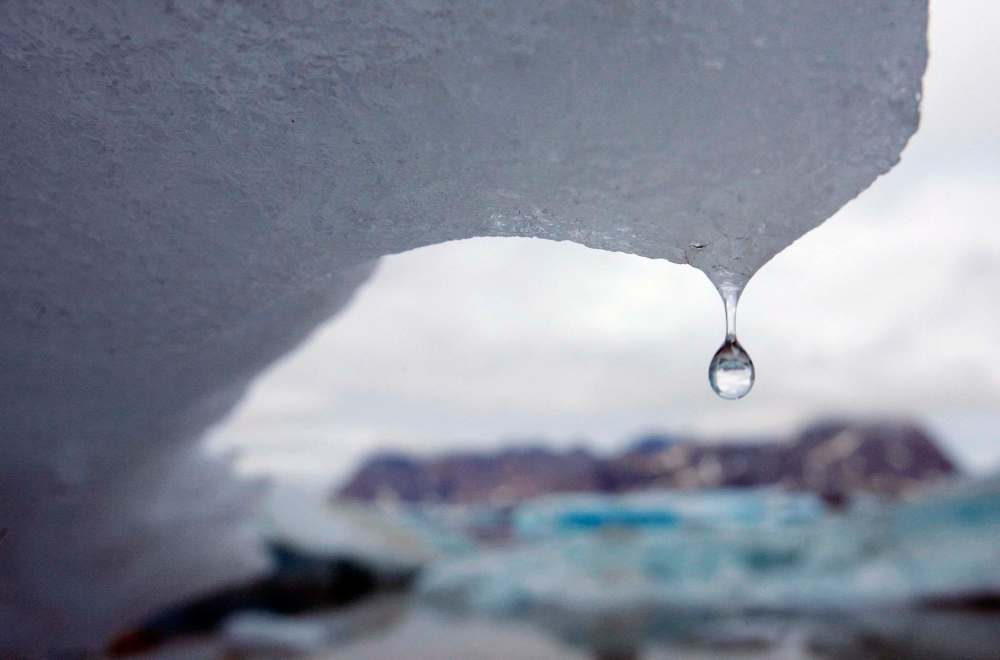
So, as the world gave thanks this weekend, the United Nations released one of the most dire reports ever published on climate change. The study, by the international Intergovernmental Panel on Climate Change (IPCC), calls for “rapid, far-reaching and unprecedented changes in all aspects of society,” after studying more than 6,000 findings by more than 100 scientists across 40 countries.
It concludes the world is close to a tipping point, with a 1 C rise in average global temperature since the industrial age the cause of modern extreme weather, rising sea levels, and drastic changes to the environment.
All it takes is a rise in another half-degree and humanity is facing unprecedented catastrophe, the end of coral reefs, devastating flooding, and massive human migration. At the world’s current rate of environmental degradation, this will happen by 2030 – unless efforts are taken.

By the end of the century, the IPCC declares, the world will hit a 3 C increase and an endgame.
The cause: humans. We created the problem and are suffering now due to it.
“The report strongly concludes that climate change is already affecting people, ecosystems and livelihoods all around the world,” Prof. Ove Hoegh-Guldberg writes, and “it is beyond reasonable doubt that humans are responsible.”
Climate change by the numbers
1 C: Increase in average global ground temperature in 2016, compared to the mid 19th century
0.2 C: Average increase in average global ground temperature each decade currently
1.5 C: The maximum increase in global temperature the United Nations Intergovernmental Panel on Climate Change says the world should aim for to prevent catastrophic, irreversible impacts like flooding, famines, droughts and hurricanes
2 C: The long term goal of the Paris climate change accord for global warming
3 C – 4 C: Amount the UN says the Arctic has warmed up compared to pre-industrial times
4.5 tonnes: Amount of emissions coming from the tailpipe of an average passenger car over the course of a year
704 million tonnes: Amount of total emissions coming from Canada in 2016, the latest year for which the numbers are available
512.4 million tonnes: Current target for Canada’s emissions by 2030, equivalent to 70 per cent of what Canada’s emissions were in 2005
385 million tonnes: Target the UN suggests Canada should aim for to keep the world from warming beyond 1.5 C
45 per cent: Portion of Canada’s emissions that came from the energy sector in 2016
20 per cent: Portion of Canada’s emissions that come from road transportation in 2016
-The Canadian Press
The solutions are well-documented, but include reducing energy use, focusing on renewable resources and – most importantly – reducing virtually half of the carbon emitted into the atmosphere by industries and individuals.
Some of this can be done through technology but, for the most part, humans have to change the way we live.
“Limiting warming to 1.5 C is possible within the laws of chemistry and physics,” says Prof. Jim Skea of the IPCC, “but doing so would require unprecedented changes.”
The line has been drawn. It’s now up to us to see it.
Approximately 97 per cent of the world’s scientists argue climate change is real. Climate change deniers have to perform somersaults in reasoning, cherry-pick facts to create conspiracy theories, and argue perspectives tantamount to a flat Earth to make their points.
With terms such as “fake news,” facts get obscured. But, look around: glacial disappearances, warming oceans, and extreme weather is increasing.
Naysayers point the finger at high-emitter polluter nations, saying: “Why do we have to change if they don’t?”
This is a hard one to respond to. Ethics, or doing the right thing, always is. Living by the morals of cheaters, liars, and exploiters is to give up on honesty, generosity and justice – things worth living for.
Governments often rely on financial arguments to undermine climate change policies.
Manitoba Premier Brian Pallister, when rejecting the federal government’s carbon tax policy last week, said it’s better to “keep money in the pockets of Manitobans.”
The impending climate change will be much more expensive then a few cents at the gas station, though. The IPCC estimates the costs from warming will be US$54 trillion if the world warms by 1.5 C, and US$69 trillion if temperatures reach an extra 2 C.
The issue is how to convince the world spending billions now on technological innovation and changing lifestyles will save trillions in the future.
This can only come from education. Climate change deniers and governments can deny immediate action when people don’t understand what “carbon tax” and “cap-and-trade” policy are. Convincing people what to think is easy when politicians turn a fact-based issue into a dislike for a prime minister.
The Paris Agreement – signed by almost 200 countries to find their own solutions by 2020 to keep the global average temperature increase to 1.5 C – is not a political “agenda.”
It’s a solution and, at the moment, one of the only solutions the world’s got.
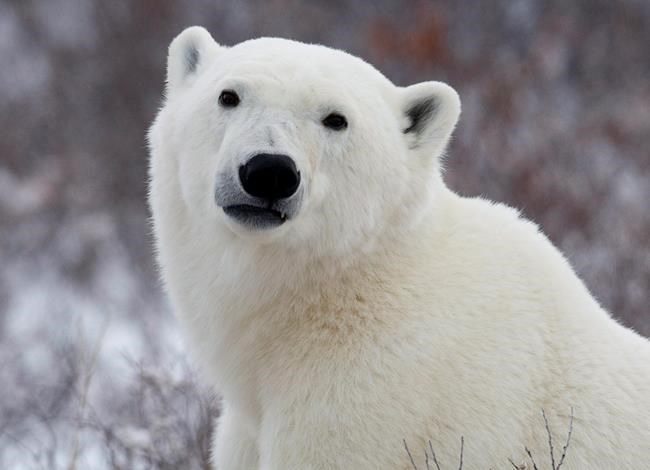
So, get up to speed. I can’t blame you if you don’t want to read the 700-page IPCC report, but there is a summary… and Youtube videos, podcasts, and news pieces.
Read. Talk. Then, act.
That’s how we combat ignorance. That’s how we thank the Earth.
That’s how we say miigwech.
niigaan.sinclair@freepress.mb.ca

Niigaan Sinclair is Anishinaabe and is a columnist at the Winnipeg Free Press.
Our newsroom depends on a growing audience of readers to power our journalism. If you are not a paid reader, please consider becoming a subscriber.
Our newsroom depends on its audience of readers to power our journalism. Thank you for your support.




